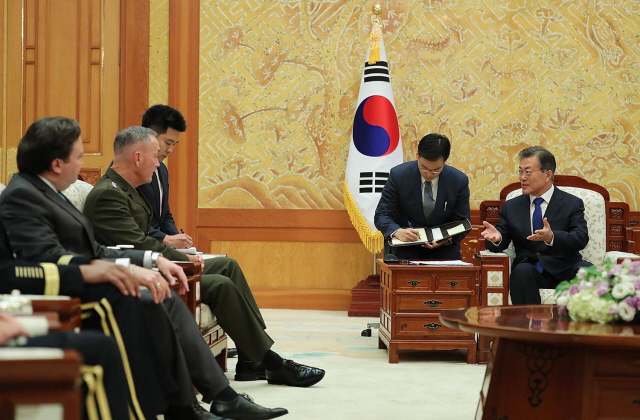이 웹사이트는 제19대 대통령 임기 종료에 따라 대통령기록관이 「대통령기록물 관리에 관한 법률」에 의해 이관받아 서비스하는 대통령기록물입니다. 자료의 열람만 가능하며 수정 · 추가 · 삭제는 불가능합니다.
다만, 「개인정보보호법」에 의하여 개인의 정보를 보호받기 원하시는 분은 관련 내용(요청자, 요청내용, 연락처, 글위치)을 대통령 웹기록물 담당자(044-211-2253)에게 요청해 주시면 신속히 검토하여 조치해 드리겠습니다. 감사합니다.
SPEECHES & REMARKS
BRIEFINGS
The President Meets with Chairman of the U.S. Joint Chiefs of Staff Gen. Joseph Dunford

President Moon Jae-in met with Gen. Joseph Dunford, Chairman of the U.S. Joint Chiefs of Staff, at Cheong Wa Dae from 4:30 to 5:20 this afternoon. The President called upon him to play an important role on the strength of a robust ROK-U.S. alliance to resolve the crisis on the Korean Peninsula caused by the North Korean nuclear and missile problems.
Welcoming Gen. Dunford to Korea, President Moon expressed his gratitude to Gen. Dunford’s father who fought in the Battle of Jangjin (Chosin) Reservoir and other battles during the Korean War as a member of the U.S. Marine Corps.
President Moon then moved on to the topic of the current security situation on the Korean Peninsula, saying that it was graver than at any time before due to the sophistication of the North’s nuclear and missile capabilities. He also stressed that it was an impending, existential threat.
Moreover, the President strongly denounced the behavior of North Korea, saying that the nation was disrupting regional and international security, including that of the Korean Peninsula, by going ahead with a series of test firings of ICBM-range ballistic missiles in defiance of the consistent opposition of the international community.
On top of this, President Moon strongly urged the North to stop provocations and come forward for a dialogue for the sake of easing tensions on the Korean Peninsula. The President and the Chairman saw eye to eye on the need for the two nations to resolutely respond to the North`s additional provocations on the basis of the robust ROK-U.S. combined defense posture.
The Chairman of the Joint Chiefs of Staff noted that the security situation on the Korean Peninsula was becoming grave due to the North Korean regime`s obsession with nuclear and missile development, including its recent series of missile provocations. In this connection, he emphasized his country`s unwavering security commitment to the defense of the Republic of Korea.
In addition, the Chairman said that the U.S. military placed priority on supporting the U.S. Government’s efforts to apply diplomatic and economic pressure for the denuclearization of the Korean Peninsula and that it was preparing a military option in case these efforts fail. The Chairman continued to say that for its response and action, the United States would seek close consultation with Korea as an ally and that everyone was hoping to resolve the current situation without war, stressing that again.
Present at the meeting were Marc Knapper, chargé d’affaires at the U.S. Embassy; Gen. Vincent K. Brooks, commander of Combined Force Command and U.S. Forces Korea; Richard D. Clarke, vice director for Strategic Plans and Policy, Joint Staff; Minister Song Young-moo of the Korean Ministry of National Defense; Chief Secretary Chung Eui-yong of the Office of National Security; Gen. Kim Byung-ju, vice commander of Combined Force Command; Lee Sang-chul, first Deputy Chief Secretary of the Office of National Security.



